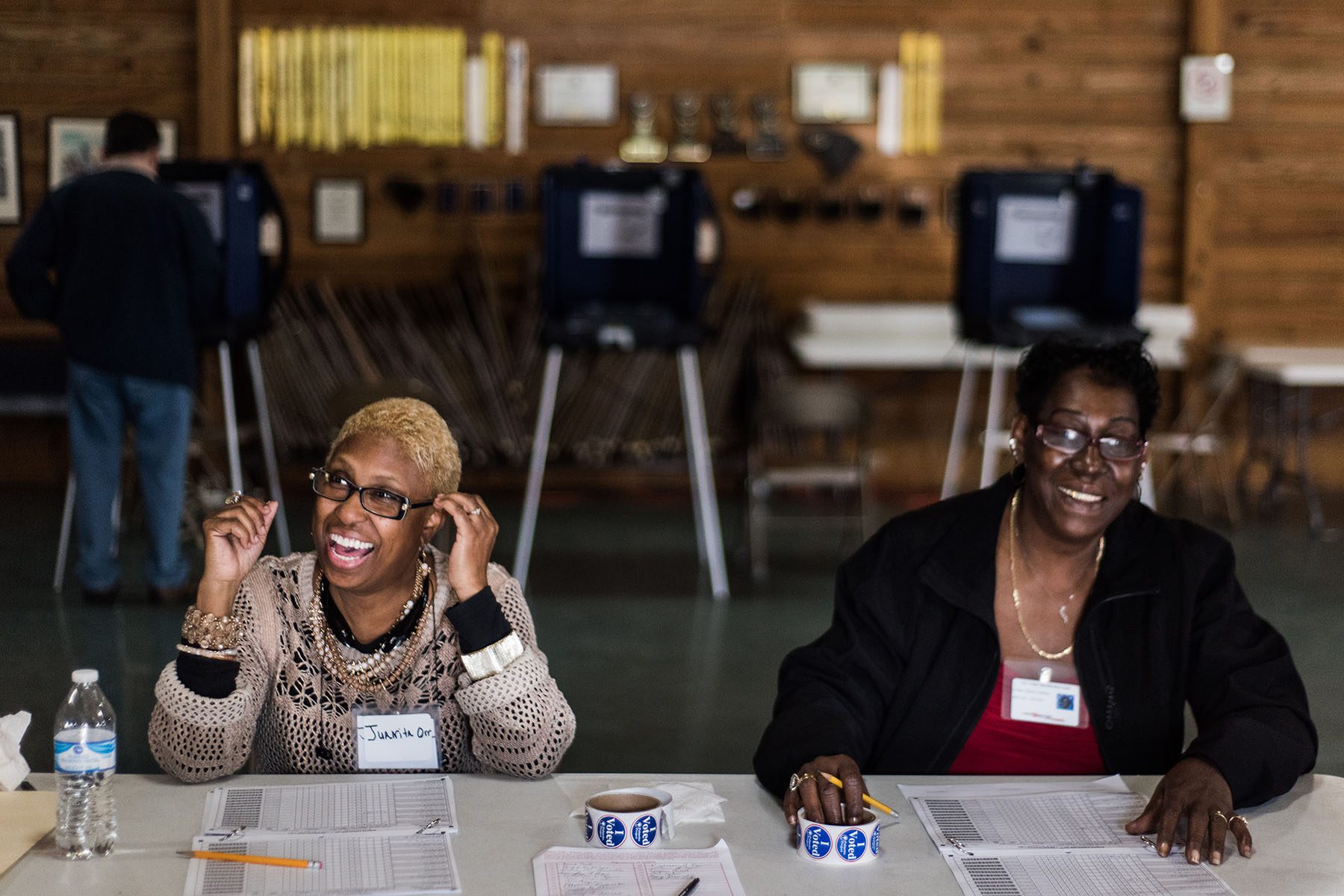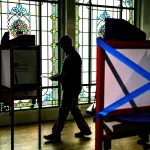When Power the Polls launched in 2020, the nonpartisan nonprofit aimed to recruit 250,000 people to sign up as poll workers around the country during the COVID-19 pandemic.
The response was overwhelming. Power the Polls, through its partnerships with about 200 nonprofit organizations and businesses, estimates it recruited more than 700,000 prospective poll workers. Jane Slusser, program manager for Power the Polls, said 97 percent of those sign-ups were people who had never been a poll worker before. She said afterward, many expressed an interest in doing the work again.
“Overwhelmingly, people were like, ‘Now I’m a poll worker for life. It was a tough day, but it was one of the most rewarding things I ever did,’” she said.
Poll workers — the people, sometimes paid and sometimes not, who help voters check in, manage lines, troubleshoot equipment or assist with office duties — have historically been older women, though data is limited.
Power the Polls wants to help election administrators recruit poll workers again amid new challenges. The election system is being tested in the face of lies spread by former President Donald Trump and his allies about widespread voter fraud, and members of the majority-women election official workforce have faced threats.
Despite those challenges, Slusser emphasized the joy that comes from being a poll worker.
“I live across from my polling location, so I always go over there on Election Day to thank everybody. It’s like a party going on,” she said. “So I think it’s something that seems serious, but it’s actually also this really fun community thing that you’re able to do with your neighbors.”
Power the Polls’ recruitment efforts, which includes finding more young people to step up, kick off in earnest with a national recruitment day on Tuesday, which is recognized by the federal government.
Slusser spoke to The 19th about the sprint to the 2022 midterms and how she already has her eyes on what’s to come after November — not just the 2024 presidential election but smaller state and local races in 2023.
“It’s not a one-year solution,” she said about poll worker recruitment. “It’s really something that’s going to be recurring all the time.”
See Power the Polls’ signup page here. This interview has been edited for length and clarity.
Barbara Rodriguez: Why is poll worker recruitment so important for America’s elections?
Jane Slusser: Poll workers are really sort of essential workers of democracy, and they make sure that the basic act of being able to cast your ballot is available to everybody. Without enough poll workers staffing a location, those polling locations can be shut down. Which means a voter who may only have had to walk two blocks to their polling location now has to drive 20 minutes, and that’s not great.
Poll workers need to staff locations so that we don’t have things like long lines. Somebody who doesn’t have time to wait in line can’t vote, and they’re disenfranchised because of that. Voters need assistance, whether that is just checking in and the simple things that a voter needs. Or voters that have special disabilities that require more assistance, voters that require language assistance. Anything like that requires a poll worker to be there to help make sure that that person can cast their ballot. So really without poll workers, being able to vote in person can’t happen.

What exactly are the challenges to recruiting poll workers?
When we were first founded in 2020, a lot of the challenge there was just people being concerned about their health. The average age of a poll worker is over 60. Back then, it was just very much focused on health.
I think now, this year, one of the challenges is awareness. Folks are not aware that this is an opportunity, that they need to step up. The other big challenge is election administrators are often trying to do this with very limited resources. So you read about people having a hard time hiring folks in general — election administrators are no different. But sometimes they’re doing it with even fewer resources than a normal business.
And then I think one of the biggest hurdles to becoming a poll worker that we’ve heard, that sort of keeps people who are interested from actually being able to go through with it, is that it requires an enormous time commitment on the day of Election Day. So there’s early voting and there’s Election Day poll workers. Often, early voting, there are requirements that mean that people need to come back over the course of two weeks. And sometimes people can’t do that because they have other commitments in their life. They’ve got kids, they’ve got a job. So they can’t do that. And then some folks are not able to sort of meet the physical demands of waking up and being at a polling location from 6 a.m until 10 p.m.
I want to give space to some of the general coverage emerging about poll worker shortages or concerns of the ongoing effects of the 2020 election when it comes to unfounded allegations of widespread voter fraud and what kind of effect that might have on people wanting to be poll workers. What role is that playing, and what is important to keep in mind about that narrative?
I do think one thing that’s important to keep in mind about that narrative is not to let it sort of overrun things and discourage folks and make them have concerns about serving as a poll worker. This is something that is safe.
One of the things that we have found — we monitor when people sign up with us — is sometimes people don’t finish their applications and then they tell us why. Sometimes we hear people say, “Oh, I read a story about safety” and that’s why they’re not able to do this.
More often than not, people say, “I read about that. And that’s why I think it’s important for people like me to step up, because I feel safe doing this. I’m not politically motivated. I don’t care who you’re voting for. I just care that you’re able to vote.” And so I think that in some cases it actually becomes more motivating to people.
We’re obviously a nonpartisan initiative. So I think the folks signing up with us, they just want to be good neighbors in their community and they come at it with that perspective.
From a logistical standpoint, is there more to better explain to readers what the need is in terms of poll workers? When we talk about a shortage, is there an actual way to measure that?
We identify shortages through a couple of different methods. We monitor media coverage around when administrators say that they have a shortage. And we also reach out to them through our own outreach and through partners.
In some places, like for instance in Allegheny County, Pennsylvania, that’s a big county. They’re always going to need a ton of poll workers, they need thousands of poll workers. And so we kind of know that and we check in about that. But we also identify some places that are much smaller where the gap is only 25 individuals. But if those 25 individuals aren’t in town, that could be the entire half of a county not able to have a polling location. So we share that information out as we’re doing recruitment.
There’s two, I think, important qualities that we’ve heard just across the board that are very important to administrators as they’re looking to recruit people. One is the need for people who are bilingual to provide language access. We have over 200 jurisdictions looking for Spanish-language speakers that we’ve identified, and roughly 75 other locations that are looking for at least 45 more languages. So if you speak two languages, that’s great because you’re able to provide assistance for folks in that other language as well.
The other big need that we hear a lot is around tech savviness. That means you’re comfortable operating an iPad or a smartphone because a lot of voting machines now are more technology-based.
Is there more to better explain what Power the Polls is doing between now and the midterm elections to recruit poll workers and what that outreach looks like?
So August 16 is our big day, Poll Worker Recruitment Day. That’s sort of an opportunity for us to link up with the businesses and the nonprofits and the many election administrators across the country who need to recruit poll workers. It’s also an opportunity for us to get awareness out through celebrities and social media so that folks really become aware of this, and are able to get their applications in as early as possible so that they can get trained and they can be in the process for administrators to get them placed as poll workers.
We will have a lot of recruitment happen basically through early- to mid-September. Then the month of October in most places means that people are getting trained, they’re getting their assignments. They ask all their last-minute questions and then they’re ready to go for Election Day in November, or they’re already starting to serve where places have early voting.
Is there anything else that I haven’t asked you that you think would be important for folks to keep in mind about poll workers and the midterms?
One of the reasons why we see shortages happening this year is people pay more attention to elections in a presidential year sometimes than they do in the midterm election.
You need to participate in democracy every single election that you can. Poll workers are really needed not just in those big years, but also in the midterms and also in your local elections. If you are thinking about being a poll worker, signing up to work in a midterm and then signing up to work in your local election is a good way to get that experience before you are faced with some of those presidential turnout numbers, which can be more intimidating when you have a really busy polling place.
The final thing that I would say: Not everybody is able to become a poll worker. It’s a hard day. I just got an email that I was looking over from a woman who was like, “I’m the primary caregiver for my daughter, and I just realized that I can’t actually commit to be somewhere from 6 a.m. to 8 p.m.” As a new mom myself, I completely understood that. So one of the most important things is if you aren’t able to be a poll worker now, think about being one in the future. Think about recruiting other people, but also just think about being appreciative of the people that do step up and serve in those roles. These are folks that are just trying to help out in their community, and it’s really important for us to applaud them. When you go in and vote, thank them. Understand how early they woke up and how hard this job is for them to do and they’re only doing it so that you can exercise your right to vote.
See Power the Polls’ signup page here.







